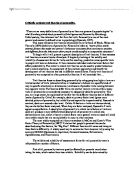Compare and contrast the person-centered approach and cognitive-behavioural approaches to understanding and working with fear and sadness. Which of these two approaches do you feel more drawn to and why?
Compare and contrast the person-centered approach and cognitive-behavioural approaches to understanding and working with fear and sadness. Which of these two approaches do you feel more drawn to and why? -------------------------------------------------------- In this essay I will look[KHB1] at the key features of the cognitive behavioural approach and the person centered approach, I will look at the differences and similarities of the two approaches and explain why I am drawn to the person centered approach. The overall purpose of cognitive behavioural therapy is to increase self awareness, introduce better understanding, and improve self control by developing more appropriate responses to negative feelings. The goals of the person-centered therapy are to increase ones self-esteem, to have a greater openness to experience and to find out where you belong in life and be content with it. Both therapies help individuals to experience and express feelings at the moment they occur, rather than dwell on them at a later date. I will first look at the Cognitive behavioural therapy which was founded by Beck (1976), he believed that "the emotional and behavioural difficulties that people experience in their lives are not caused directly by events, but by the way they interpret and make sense of these events "as sited in Introduction to counselling p143. It is based on the fact that
Compare and contrast Piaget's and Vygotsky's views of cognitive development.
Compare and contrast Piaget's and Vygotsky's views of cognitive development. Cognitive development is the growth in our capabilities as learners. Cognitive development theory attempts to explain how humans acquire and construct knowledge of themselves and their world. The first systematic theory of cognitive development was proposed by Jean Piaget, however there are other major theoretical approaches to cognitive development, including those of Vygotsky. Piaget approached the subject from a biological, nature, perspective, whereas Vygotsky approached the subject from an environmental, nurture, perspective. This leads to major differences in their theories regarding the way in which we learn and the importance of certain aspects such as language on cognitive development. Piaget's theory focuses on the organisation of intelligence and how it changes as children grow. Whereas Vygotsky's theory centres around the social process and he defines intelligence as the capacity to learn from instruction. We will also look at the impact both men's theories have had on education and how they have been applied to education. For better or worse. We will, therefore, look at these differences along with others, as well as the similarities of Piaget's and Vygotsky's theories and compare and contrast them. Both Piaget and Vygotsky were influenced by the evolutionary implications of Darwin's
Evaluate the claim that Person-Centred Therapy offers the therapist all that he/she need to treat the clients
Chrysalis Counselling CourseModule 1Krisztina Paladi-Kovacs July 2012 “Evaluate the claim that Person-Centred Therapy offers the therapist all that he/she need to treat the clients.” In this essay I will define what Person–Centred Therapy (PCT) is and I will look at the origins of this therapy with particular reference to Abraham Maslow and Carl Rogers and examine the fundamental elements necessary for the therapy to be seen as patient centred. I will compare the benefits and disadvantages of Person-Centred Therapy and try to establish whether a therapist can treat all clients effectively using just the one approach or whether it is more beneficial to the client for the therapist to use a more multi-disciplinary approach. To be able to discuss this subject, it is important to describe first what we mean when discussing PCT. Person-Centred Therapy, also known as client-centred, non-directive, or Rogerian therapy, is an approach to counselling and psychotherapy that places much of the responsibility for the treatment process on the client, with the therapist taking a non-directive role. PCT emphasises person to person relationship between the therapist and client and focuses on the client’s point of view; through active listening the therapist tries to understand the client’s present issues and emotions. In PCT the client determines the direction, course, speed
Critically evaluate trait theories of personality.
Critically evaluate trait theories of personality. "There are as many definitions of personality as there are personality psychologists" is what Sternberg stated about personality (Intelligence and Personality /Sternberg). Unfortunately, this statement isn't far from the truth. Personality is one of the most general and unclearly defined terms in psychology (Eysenck, 1957). This essay evaluates trait theories of personality on the basis of Block, Weiss and Thorne's (1979) definition of personality: Personality refers to "more of less stable internal factors that make one person's behaviour consistent from one time to another, and different from the behaviour other people would manifest in comparable situations". To begin with it will present a general description of trait theories. It then assesses trait theories on several levels of analysis. It begins by looking at the validity and reliability of assessment forms for traits and the resulting predictive value specific traits in people will have on behaviour. It then evaluates individual and situational factors that affect predictability. The extent to which trait theories can be used to predict behaviour and in which situations. An assessment of the practical application and benefit the development of trait theories has had in different areas follows. Finally trait theories of personality are compared to other






